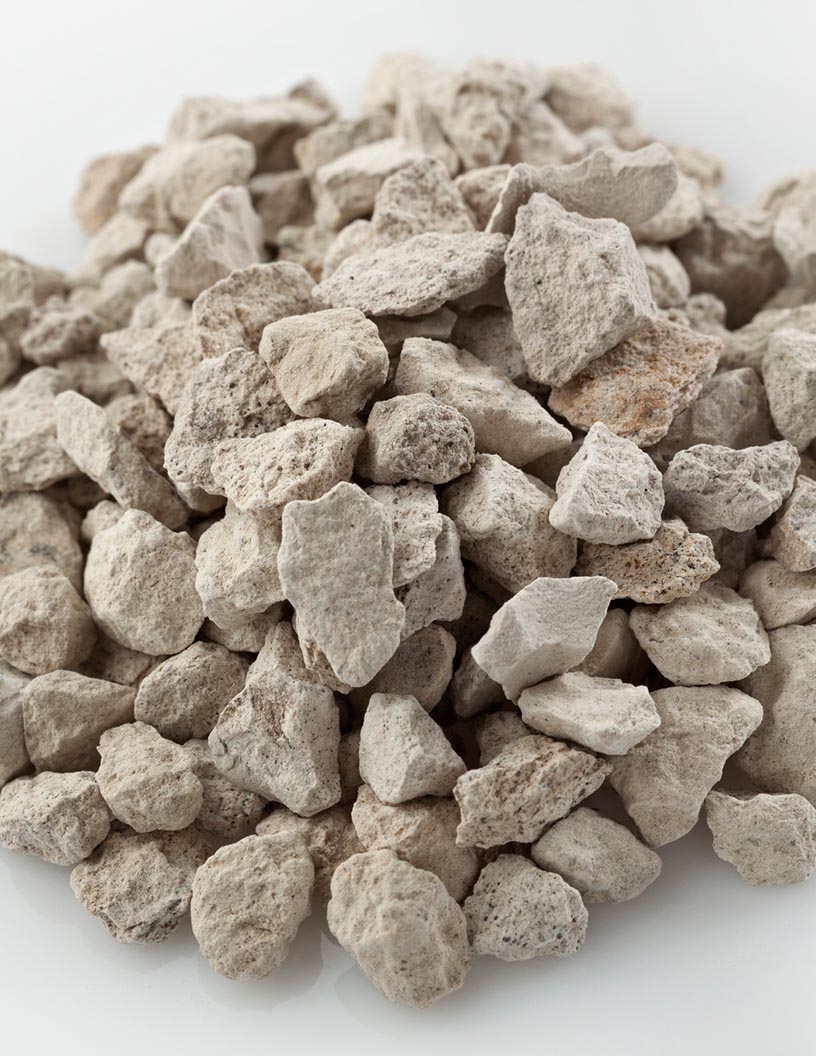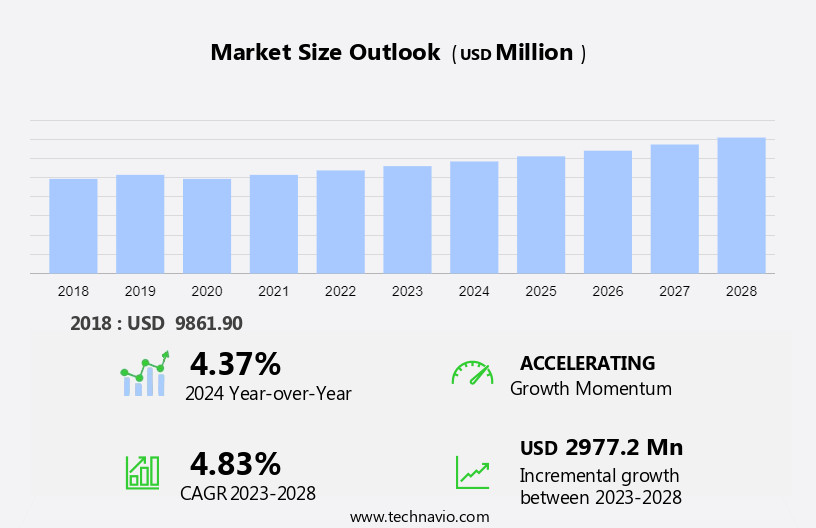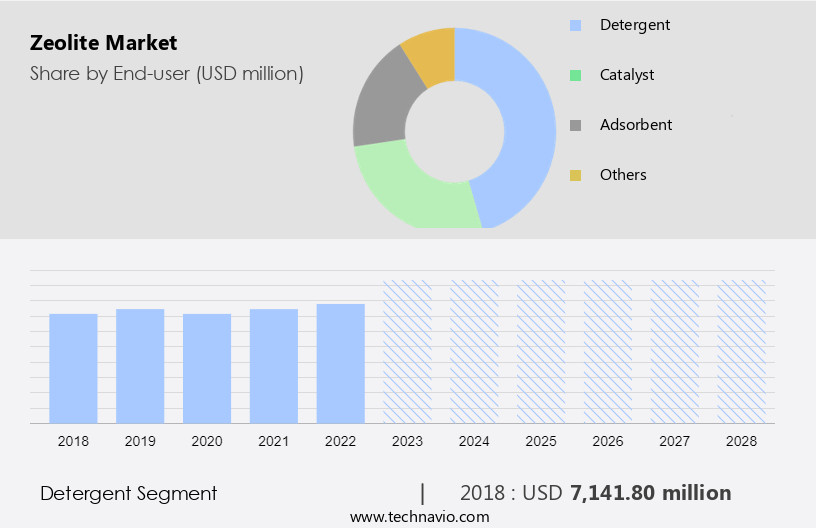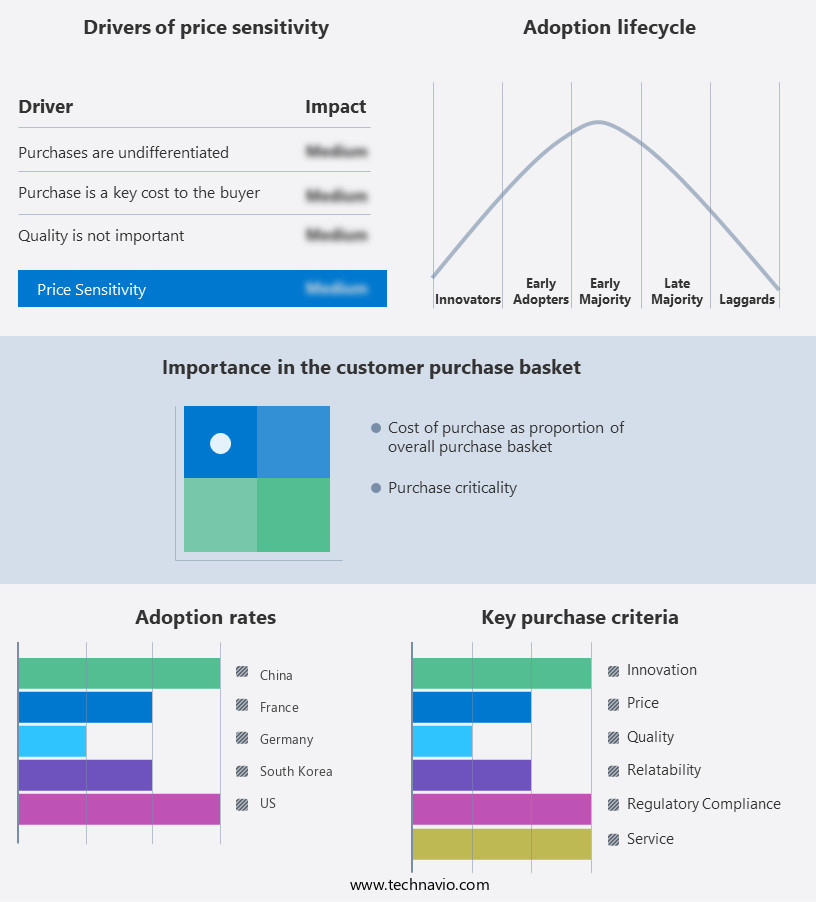Zeolite Market Size 2024-2028
The zeolite market size is forecast to increase by USD 2.98 billion at a CAGR of 4.83% between 2023 and 2028.
- The market is experiencing significant growth due to the increasing use of zeolites as refrigeration adsorbents and as a substitute for sodium phosphate. Zeolites, a type of microporous aluminosilicate mineral, have gained popularity in various industries, including water treatment, chemical processing, and refrigeration. In the refrigeration industry, zeolites are increasingly being used as adsorbents due to their high adsorption capacity and selectivity. Furthermore, the construction industry is adopting zeolites as an alternative to sodium phosphate in concrete production, contributing to market expansion. Additionally, the use of zeolites in groundwater and wastewater treatment technologies is gaining traction due to stringent environmental regulations. Moreover, they offer several advantages over traditional refrigerants, such as lower global warming potential and zero ozone depletion. Additionally, the high logistics cost associated with the transportation and handling of refrigerants is driving the demand for zeolites as a cost-effective alternative. However, the high cost of producing high-quality zeolites remains a challenge for market growth. Overall, the market is expected to witness steady growth In the coming years due to its diverse applications and the increasing demand for eco-friendly and cost-effective solutions.
What will be the Size of the Zeolite Market During the Forecast Period?
- The market encompasses the production and application of synthetic zeolites, aluminosilicate minerals widely used in various industries. Key end-use sectors include petrochemicals production for detergent builders and catalysts, and water filtration. Synthetic zeolites' high stability, selectivity, and conversion procedures make them indispensable in chemical reactions.
- Beyond petrochemicals, zeolites find applications in water treatment, animal feed, and as alternatives to perlite, diatomite, and fuller's earth. The International Zeolite Association reports a growing global zeolite production trend due to increasing demand for water treatment and catalysts. Sodium tripolyphosphate, a common detergent builder, is also produced using zeolites. Overall, the market is driven by the demand for efficient catalysts, water filtration solutions, and the expansion of petrochemicals production.
How is this Zeolite Industry segmented and which is the largest segment?
The zeolite industry research report provides comprehensive data (region-wise segment analysis), with forecasts and estimates in "USD million" for the period 2024-2028, as well as historical data from 2018-2022 for the following segments.
- End-user
- Detergent
- Catalyst
- Adsorbent
- Others
- Product Type
- Natural
- Synthetic
- Geography
- Europe
- Germany
- France
- APAC
- China
- South Korea
- North America
- US
- Middle East and Africa
- South America
- Europe
By End-user Insights
- The detergent segment is estimated to witness significant growth during the forecast period.
Zeolite, an essential aluminosilicate mineral, holds significant market value in various industries, with detergents being the largest application segment. In 2023, detergents accounted for the majority of the market share, driven by its superior ability to produce demineralized water through calcium ion exchange. This property effectively enhances detergent performance in removing stains and dirt from fabrics. Zeolite's adoption in detergents is increasing as an eco-friendly alternative to sodium tripolyphosphate, which poses environmental concerns.
Furthermore, zeolite's capacity to remove heavy metal ions, such as copper, iron, and manganese, adds to its market appeal. In petrochemicals production, zeolites serve as catalysts for chemical reactions, ensuring high activity, selectivity, and stability during conversion procedures. Zeolites also find extensive use in water filtration, agriculture, and refinery expansion projects. The market is expected to grow due to increasing demand from these applications, particularly in water treatment, animal feed, and biofuel industries.
Get a glance at the Zeolite Industry report of share of various segments Request Free Sample
The detergent segment was valued at USD 7.14 billion in 2018 and showed a gradual increase during the forecast period.
Regional Analysis
- APAC is estimated to contribute 30% to the growth of the global market during the forecast period.
Technavio's analysts have elaborately explained the regional trends and drivers that shape the market during the forecast period.
For more insights on the market share of various regions, Request Free Sample
The European market holds the largest share In the global zeolite industry, driven by the growing utilization of zeolite in nuclear waste removal and the support from European governments for the production of bio-based chemicals. The presence of abundant natural zeolite resources in Turkey and Russia further boosts market expansion. Additionally, the increasing demand for zeolite in wastewater treatment and gas drying applications will fuel market growth in Europe.
Zeolite's use as a catalyst in petrochemical processes, detergent builders, and animal feed additives also contributes to market growth. In the petrochemical sector, zeolite's high activity, selectivity, and stability make it an essential component in catalytic processes, enhancing refinery output. The construction industry's increasing demand for water treatment technologies, including sludge treatment capacity and groundwater filtration, also drives market growth. The market encompasses various applications, including water treatment, biofuel, agriculture, and refineries.
Market Dynamics
Our zeolite market researchers analyzed the data with 2023 as the base year, along with the key drivers, trends, and challenges. A holistic analysis of drivers will help companies refine their marketing strategies to gain a competitive advantage.
What are the key market drivers leading to the rise In the adoption of Zeolite Industry?
The increasing use of zeolite as a refrigeration adsorbent is the key driver of the market.
- Zeolites, a type of aluminosilicate minerals, have gained significant attention in various industries due to their unique properties. Synthetic zeolites, specifically, are widely used in petrochemicals production as catalysts for chemical reactions, enhancing the stability, selectivity, and conversion procedures in refineries. This results in increased refinery output and improved petrochemical facilities. In the detergent industry, zeolites serve as detergent builders, enhancing the cleaning power of sodium tripolyphosphate. Chevron Phillips Chemical, for instance, recently made a Final Investment Decision to expand its production capacity of zeolite-based detergent builders. Beyond petrochemicals and detergents, zeolites also play a crucial role in water filtration and treatment technologies. They are used in wastewater treatment and sludge treatment capacity enhancement, ensuring cleaner water for agriculture, construction, and other sectors.
- In the agriculture sector, zeolites are used as additives for fodder crops, contributing to increased biofuel and bioenergy consumption. Moreover, zeolites are utilized in refineries for groundwater treatment and wastewater treatment, ensuring compliance with environmental regulations. Global zeolite production is projected to grow due to increasing demand from these industries, making it a promising market for investment. Thus, such factors are driving the growth of the market during the forecast period
What are the market trends shaping the Zeolite Industry?
An increasing use of zeolites as a substitute for sodium phosphate is the upcoming market trend.
- Zeolites, a type of aluminosilicate minerals, play a significant role in various industries, including petrochemicals production and water filtration. In petrochemicals, synthetic zeolites serve as catalysts for chemical reactions, enhancing the stability, selectivity, and conversion procedures in refineries. These minerals are also used as detergent builders in the production of detergents, replacing traditional materials like perlite, diatomite, and fuller's earth. Chevron Phillips Chemical recently made a Final Investment Decision (FID) to expand its petrochemical facility in Sweeny, Texas, using synthetic zeolites in the production of sodium tripolyphosphate. This expansion will contribute to global zeolite production, which is projected to grow due to increasing demand from water treatment applications. Beyond petrochemicals, zeolites find use in water filtration, agriculture, and bioenergy consumption. In agriculture, zeolites are used as animal feed additives and for growing fodder crops. In construction, they are used for groundwater recharge and wastewater treatment technologies.
- Moreover, in the refining sector, zeolites improve refinery output by increasing sludge treatment capacity and reducing wastewater generation. The market is expected to grow due to the increasing demand for biofuels and bioenergy consumption. Zeolites are used as catalysts in the conversion procedures of liquid ingredients in petrochemical facilities and biofuel production. Their high activity and selectivity make them an essential component in various industrial applications. Thus, such trends will shape the growth of the market during the forecast period.
What challenges does the Zeolite Industry face during its growth?
High logistics cost is a key challenge affecting the industry's growth.
- Zeolites, a type of aluminosilicate minerals, have gained significant attention in various industries due to their unique properties. In petrochemicals production, synthetic zeolites serve as effective catalysts for chemical reactions, enhancing the conversion procedures and improving the stability, selectivity, and efficiency of refineries. Chevron Phillips Chemical recently made a Final Investment Decision to expand its petrochemical facility in Texas, USA, utilizing zeolite catalysts for the production of polyethylene and polypropylene. Beyond petrochemicals, zeolites find extensive applications in detergent production as detergents builders, improving the performance of liquid ingredients in cleaning solutions. Zeolites are also employed in water filtration, providing effective solutions for wastewater treatment technologies and sludge treatment capacity expansion. In the agriculture sector, zeolites are used as animal feed additives, enhancing the nutritional value of fodder crops and contributing to the growth of the sector's GDP.
- Moreover, zeolites have gained traction in the construction industry as an adsorbent for groundwater treatment and in biofuel and bioenergy consumption for energy generation. With the increasing demand for sustainable and eco-friendly solutions, global zeolite production is expected to grow, driven by the expanding refinery output and the need for advanced water treatment technologies. Key applications include catalysts, water treatment, animal feed, and refinery expansion. Perlite, diatomite, and fuller's earth are natural zeolites with similar properties, but synthetic zeolites offer superior performance and consistency in various applications. Sodium tripolyphosphate, a common phosphate-based detergent builder, is often replaced by zeolites due to their superior properties. Hence, the above factors will impede the growth of the market during the forecast period.
Exclusive Customer Landscape
The zeolite market forecasting report includes the adoption lifecycle of the market, market growth and forecasting, covering from the innovator's stage to the laggard's stage. It focuses on adoption rates in different regions based on penetration. Furthermore, the zeolite market report also includes key purchase criteria and drivers of price sensitivity to help companies evaluate and develop their market growth analysis strategies.
Customer Landscape
Key Companies & Market Insights
Companies are implementing various strategies, such as strategic alliances, zeolite market forecast, partnerships, mergers and acquisitions, geographical expansion, and product/service launches, to enhance their presence In the industry. The industry research and growth report includes detailed analyses of the competitive landscape of the market and information about key companies, including:
- Antenchem
- Arkema SA
- BASF SE
- Blue Pacific Minerals Ltd
- Clariant AG
- CWK Chemiewerk Bad Kostritz GmbH
- Hengye Inc.
- Honeywell International Inc.
- International Zeolite Corp
- Interra Global
- KMI Zeolite Inc.
- KNT Group
- Lenntech BV
- St. Cloud Mining
- Tosoh Corp.
- United States Antimony Corp
- W. R. Grace and Co.
- ZEOCEM AS
- Zeochem AG
- Zeolyst International
Qualitative and quantitative analysis of companies has been conducted to help clients understand the wider business environment as well as the strengths and weaknesses of key industry players. Data is qualitatively analyzed to categorize companies as pure play, category-focused, industry-focused, and diversified; it is quantitatively analyzed to categorize companies as dominant, leading, strong, tentative, and weak.
Research Analyst Overview
Zeolites, a type of aluminosilicate minerals, have gained significant attention in various industries due to their unique properties. These microporous materials exhibit high surface area, ion exchange capacity, and catalytic activity, making them valuable in numerous applications. In this context, the market encompasses a wide range of sectors, including petrochemicals production, detergent, water filtration, animal feed, and catalysts. Petrochemicals production is one of the primary industries that utilize zeolites. Synthetic zeolites, specifically, are extensively employed as catalysts In the production of petrochemicals. Their high activity, selectivity, and stability make them ideal for conversion procedures in petrochemical facilities. The petrochemical industry's expansion, driven by increasing demand for plastics and other petrochemical products, is expected to fuel the growth of the market.
Additionally, another significant application of zeolites is In the detergent industry. Zeolites serve as detergent builders, enhancing the cleaning power and phosphate removal capabilities of detergents. The global detergent market's growth, driven by increasing consumer awareness and rising living standards, is expected to boost the demand for zeolites. Beyond these traditional applications, zeolites are finding new uses in emerging industries. For instance, they are being explored as potential adsorbents for water treatment In the agricultural sector. Zeolites' ability to absorb water and nutrients makes them suitable for use in irrigation systems and fertilizers, particularly for fodder crops. Moreover, the growing focus on biofuels and bioenergy consumption is driving research into using zeolites as catalysts for biofuel production. The construction industry is another potential market for zeolites. They can be used as lightweight aggregates in place of perlite, diatomite, or fuller's earth. Zeolites' unique properties, such as their high porosity and thermal insulation, make them attractive alternatives to traditional aggregates. The market's growth is also influenced by factors such as GDP, refinery output, and refinery expansion. As economies grow and industrialization continues, the demand for petrochemicals and other zeolite-intensive products is expected to rise.
Similarly, refinery expansions and upgrades often involve the adoption of new catalytic processes that utilize zeolites. Despite these opportunities, the market faces challenges. Social and travel restrictions, as well as logistical issues, can impact the supply chain and increase costs. Moreover, the market's growth is subject to the overall economic climate and regulatory environment. In summary, the market is a dynamic and diverse landscape, driven by the demands of various industries and applications. From petrochemicals production to water filtration, zeolites' unique properties make them indispensable in numerous sectors. As research and development continue to uncover new uses for zeolites, the market is poised for continued growth.
|
Zeolite Market Scope |
|
|
Report Coverage |
Details |
|
Page number |
162 |
|
Base year |
2023 |
|
Historic period |
2018-2022 |
|
Forecast period |
2024-2028 |
|
Growth momentum & CAGR |
Accelerate at a CAGR of 4.83% |
|
Market growth 2024-2028 |
USD 2.98 billion |
|
Market structure |
Fragmented |
|
YoY growth 2023-2024(%) |
4.37 |
|
Key countries |
China, US, Germany, France, and South Korea |
|
Competitive landscape |
Leading Companies, Market Positioning of Companies, Competitive Strategies, and Industry Risks |
What are the Key Data Covered in this Zeolite Market Research and Growth Report?
- CAGR of the Zeolite industry during the forecast period
- Detailed information on factors that will drive the Zeolite growth and forecasting between 2024 and 2028
- Precise estimation of the size of the market and its contribution of the industry in focus to the parent market
- Accurate predictions about upcoming growth and trends and changes in consumer behaviour
- Growth of the market across Europe, APAC, North America, Middle East and Africa, and South America
- Thorough analysis of the market's competitive landscape and detailed information about companies
- Comprehensive analysis of factors that will challenge the zeolite market growth of industry companies
We can help! Our analysts can customize this zeolite market research report to meet your requirements.




